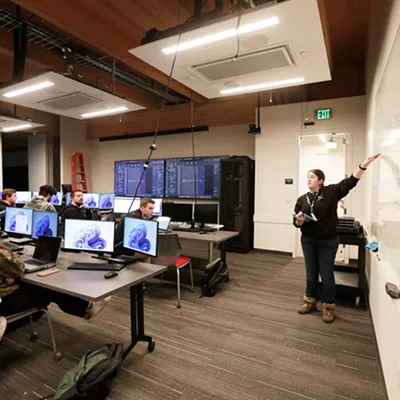Holocaust to Hope
[
{
"name": "Broadstreet - Instory",
"component": "25846487",
"insertPoint": "4",
"requiredCountToDisplay": "4"
},{
"name": "Broadstreet - Empower Local",
"component": "27852456",
"insertPoint": "8",
"requiredCountToDisplay": "8"
},{
"name": "Broadstreet - Instory",
"component": "25846487",
"insertPoint": "12",
"requiredCountToDisplay": "12"
},{
"name": "Broadstreet - Instory - 728x90 / 970x250",
"component": "27852677",
"insertPoint": "18",
"requiredCountToDisplay": "18"
},{
"name": "Broadstreet - Instory",
"component": "25846487",
"insertPoint": "5th",
"startingPoint": "23",
"requiredCountToDisplay": "24",
"maxInsertions": 100
}
]
by Michael Bowen
A play about the Holocaust done in something called "black box" style? Sounds pretty grim. We all have our own worries. Why go out of your way to get more dejected than you already are?
But Tracey Benson, first-year artistic director at Lake City Playhouse and director of A Shayna Maidel (to be performed at Coeur d'Alene's community theater Nov. 11-20), emphasizes that Barbara Lebow's drama isn't full of skeletal waifs staring out at you from behind barbed wire. "The play is less about the Holocaust and more about a family that comes out of those circumstances of the Holocaust," she says. In other words, A Shayna Maidel (which was an off-Broadway hit in the late '80s) has universal appeal. "A lot of people who are not Jewish can relate to this play," says Benson. "If you have a family, you'll understand it just fine."
In 1946 Brooklyn, Mordechai Weiss and his elder daughter Rose, a successful career woman, grow tense over the long-awaited arrival of Rose's younger sister Lusia. Back in 1930, Mordechai and Rose had emigrated to America from Poland, and the plan had always been to have Mama and Lusia accompany them. But little Lusia caught scarlet fever, and she and her mother stayed behind -- only to be caught in Hitler's grip. Now it's 16 years later, and the world is reeling over the revealed horrors of the death camps. Lusia arrives with only a childhood doll, a strong attachment to Yiddish culture and nightmares about her loved ones. The shayna maidel ("the pretty girl") has come to America to confront Mordechai and Rose -- a new pair of loved ones whom she barely knows.
Why did Benson choose such a somber drama for her first Lake City directing assignment this season? "I was born and raised here. I was around when the Aryan Nations was very active -- bombing houses and leaving burning crosses around," she says. She attended Coeur d'Alene High in the late '80s, "when there were bomb scares at the school. And even though the Aryan Nations center is gone, that way of thinking is still in our midst," says Benson. "We don't have a synagogue here [in Coeur d'Alene] -- there's no Jewish community to speak of. But in light of the Richard Butler stuff and the dissipation of the Aryan Nations, we set out to deliver a more positive message: 'Here's what we can do, in a proactive manner.'"
What Lake City can do is put on a serious drama like A Shayna Maidel in a stripped-down style that will allow audiences to concentrate on the play's message. In a black box production, Benson explains, "the furniture and the set pieces -- the flats -- are all stock pieces, literally black and nondescript. They're not period pieces, not historically representative. We do use props and costumes and lighting [as in a fully staged version], but tables, boxes and chairs are made neutral."
Once a black box set is built, it can be reused -- but being economical is not the chief motive, says Benson. "Number one, the theater could use more challenging material than [it has offered] in the past," she says. "This area could use material that is uplifting and educational about this subject matter."
Educational, because people involved with it can deliver the ring of authenticity. Playwright Lebow grew up in Brooklyn in the 1940s. So did the rabbi who's serving as Benson's advisor. So did the actor playing the father, Mordechai.
Benson says that for the play's prologue, set in 1876 Poland, Rabbi David D'Auria of the Messianic Jewish congregation in Spokane Valley, Kehilat HaMashiach, advised the cast on "how to do that prayer -- how they were moving, how they were chanting, what they were wearing."
Ed Cornachio plays Mordechai. Cornachio is a CdA resident and veteran of several Interplayers shows -- but more to the point for this show, says Benson, he grew up in the 1940s in Brooklyn "surrounded by Italians and Jews."
Cornachio and Benson have another theatrical link. "When I was 21, I played Anne Frank at NIC, back in '92," says Benson. Cornachio played her father, Otto Frank. "We both remember that play so fondly," Benson continues. "It was a really amazing play to work on back then -- we still hear from people on the street about it. It had a human rights angle in '92 -- it was in conjunction with the Human Rights Commission, which had some sort of convention in Coeur d'Alene at the same time. We filled it -- Schuler Auditorium -- every night. So it really had an impact, right after some of the times when the Aryan Nations had been at its most active."
Like The Diary of Anne Frank, says Benson, A Shayna Maidel may be heavy going, but it's not without humor. She cites the moments when Rose tries without success to Americanize her Old World sister Lusia using clothes, hairstyles and the movies. "It's an inspiring play about hope," Benson continues. "It's a positive play, not about dwelling on the bitter ashes of the past but about moving forward to a hopeful future."
Publication date: 11/04/04
A play about the Holocaust done in something called "black box" style? Sounds pretty grim. We all have our own worries. Why go out of your way to get more dejected than you already are?
But Tracey Benson, first-year artistic director at Lake City Playhouse and director of A Shayna Maidel (to be performed at Coeur d'Alene's community theater Nov. 11-20), emphasizes that Barbara Lebow's drama isn't full of skeletal waifs staring out at you from behind barbed wire. "The play is less about the Holocaust and more about a family that comes out of those circumstances of the Holocaust," she says. In other words, A Shayna Maidel (which was an off-Broadway hit in the late '80s) has universal appeal. "A lot of people who are not Jewish can relate to this play," says Benson. "If you have a family, you'll understand it just fine."
In 1946 Brooklyn, Mordechai Weiss and his elder daughter Rose, a successful career woman, grow tense over the long-awaited arrival of Rose's younger sister Lusia. Back in 1930, Mordechai and Rose had emigrated to America from Poland, and the plan had always been to have Mama and Lusia accompany them. But little Lusia caught scarlet fever, and she and her mother stayed behind -- only to be caught in Hitler's grip. Now it's 16 years later, and the world is reeling over the revealed horrors of the death camps. Lusia arrives with only a childhood doll, a strong attachment to Yiddish culture and nightmares about her loved ones. The shayna maidel ("the pretty girl") has come to America to confront Mordechai and Rose -- a new pair of loved ones whom she barely knows.
Why did Benson choose such a somber drama for her first Lake City directing assignment this season? "I was born and raised here. I was around when the Aryan Nations was very active -- bombing houses and leaving burning crosses around," she says. She attended Coeur d'Alene High in the late '80s, "when there were bomb scares at the school. And even though the Aryan Nations center is gone, that way of thinking is still in our midst," says Benson. "We don't have a synagogue here [in Coeur d'Alene] -- there's no Jewish community to speak of. But in light of the Richard Butler stuff and the dissipation of the Aryan Nations, we set out to deliver a more positive message: 'Here's what we can do, in a proactive manner.'"
What Lake City can do is put on a serious drama like A Shayna Maidel in a stripped-down style that will allow audiences to concentrate on the play's message. In a black box production, Benson explains, "the furniture and the set pieces -- the flats -- are all stock pieces, literally black and nondescript. They're not period pieces, not historically representative. We do use props and costumes and lighting [as in a fully staged version], but tables, boxes and chairs are made neutral."
Once a black box set is built, it can be reused -- but being economical is not the chief motive, says Benson. "Number one, the theater could use more challenging material than [it has offered] in the past," she says. "This area could use material that is uplifting and educational about this subject matter."
Educational, because people involved with it can deliver the ring of authenticity. Playwright Lebow grew up in Brooklyn in the 1940s. So did the rabbi who's serving as Benson's advisor. So did the actor playing the father, Mordechai.
Benson says that for the play's prologue, set in 1876 Poland, Rabbi David D'Auria of the Messianic Jewish congregation in Spokane Valley, Kehilat HaMashiach, advised the cast on "how to do that prayer -- how they were moving, how they were chanting, what they were wearing."
Ed Cornachio plays Mordechai. Cornachio is a CdA resident and veteran of several Interplayers shows -- but more to the point for this show, says Benson, he grew up in the 1940s in Brooklyn "surrounded by Italians and Jews."
Cornachio and Benson have another theatrical link. "When I was 21, I played Anne Frank at NIC, back in '92," says Benson. Cornachio played her father, Otto Frank. "We both remember that play so fondly," Benson continues. "It was a really amazing play to work on back then -- we still hear from people on the street about it. It had a human rights angle in '92 -- it was in conjunction with the Human Rights Commission, which had some sort of convention in Coeur d'Alene at the same time. We filled it -- Schuler Auditorium -- every night. So it really had an impact, right after some of the times when the Aryan Nations had been at its most active."
Like The Diary of Anne Frank, says Benson, A Shayna Maidel may be heavy going, but it's not without humor. She cites the moments when Rose tries without success to Americanize her Old World sister Lusia using clothes, hairstyles and the movies. "It's an inspiring play about hope," Benson continues. "It's a positive play, not about dwelling on the bitter ashes of the past but about moving forward to a hopeful future."
Publication date: 11/04/04

















